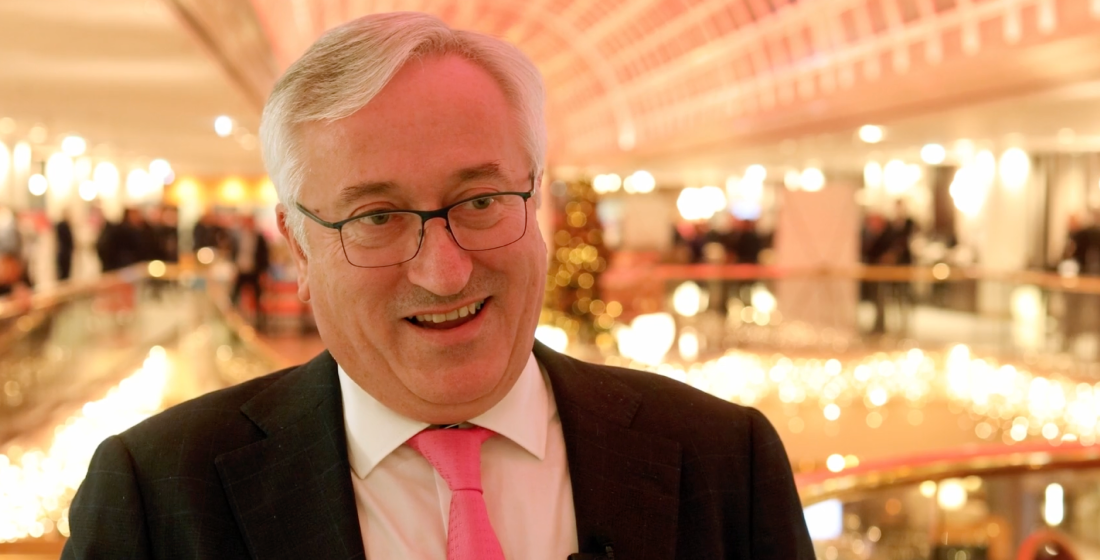Spotlight shines on future African and Asian export finance
Massive potential lies ahead for many African and Asian countries. Find out more by joining the TXF Export Finance Virtual Global Fair and embracing the best networking tools around through TXF’s very own new platform.

The last time I used my passport was early February for a few days skiing in the French Alps courtesy of close friends who have a chalet in Morzine. What bliss! It seems such a long time ago now. Since then my passport has sat in the top drawer of my residence office desk – and it looks like it will be staying there for quite some time to come!
Being male and in senior years I am of course more at risk with the Covid virus, hence my reluctance to go to pubs, restaurants, and into crowded places, particularly cities. Scared? Not really, just cautious and sensible. But very fortunately I have the luxury of living in a house with a garden and out in the British countryside some 290 km north of London. It is much closer to Manchester than London.
Nevertheless, in a normal year I would probably have been round the world by now – for clarity we all only travel economy class at TXF on all flights - and certainly would have been in Asia at least twice and in some part of Africa at least once. Needless to say, the total lack of international travel has been pants for my Instagram account – jonolion – which is predominantly made up of odd or even crazy architectural photos that I have taken usually in between TXF meetings and events in spare moments in various corners of the planet.
Covid has altered this for all of us and we have had to change our work practices accordingly. Of course, a crisis accelerates change and as a company we moved our physical events to virtual ones back in April with a two-day Africa conference. Since then, I have done a very good series of our own virtual events and also been on many webinars hosted by others in the market.
The big change now is that TXF has its very own proprietary all-singing, all-dancing custom networking-first virtual platform which formally opened for business this week following zillions of hours of coding, detailing, hard work and testing by the super clever TXF IT team. And the key is the platform’s networking-first capability to give delegates the optimum in virtual one-to-one and group meetings throughout an event. This allows us to host the TXF Virtual Export Finance World Fair 2020 starting next Monday.
What this means for you is that yes you can hear and see a first class programme of presentations, panels, quizzes, polls, fireside discussions, but you can also easily examine the delegate lists, build a network pipeline, send people messages, make calls, and set up private video meetings for several people at the event all within the TXF platform - effortlessly. Get logged in now for pre-event networking, familiarise yourself with all the cool new features and get ahead by being involved.
The TXF Virtual Export Finance World Fair 2020 starts on Monday 19 October with our 3-day Global event, followed by TXF Americas on the 22nd, TXF Future of Export Finance on 23rd, TXF MENA on 26-27th, TXF Africa on 28th, and TXF Asia on 29-30th. Each day is actually a half-day allowing you time to chose what you want to do, but still giving you a full half-day if you wanted to be in the whole event. Get involved and get back to real business! The winners of tomorrow will be the ones who embrace new ways of doing business.
We fully anticipate to have around 3,000+ people joining us across the entire TXF Global Fair as people will be signing throughout. Interestingly, looking at the current breakdown of those already registered, there are actually very few lawyers – only around 3% of current bookings! How come? I guess they are so busy with numerous restructurings, refinancings and deal work-outs that they simply haven’t got time to meet anyone else and consider new business! Should there be any lawyers out there now looking to come up for air and get involved please give my colleague Sam McManus a shout at sam.mcmanus@txfmedia.com and he will sort you out with the best terms.
Taking a closer look at a two of these six events – TXF Africa and TXF Asia cover regions where there is an extraordinary wealth of pent-up demand for export and infrastructure financing.
Rolling up your sleeves for Africa
Business in sub-Saharan African (SSA) markets is not for the feint-hearted, but where in the world is? There is little doubt though that for those prepared to venture forth and persevere within SSA building a good extended pipeline of business is not only achievable but highly rewarding. Over the last few years we have seen a range of SSA export finance deals and projects make it as TXF ECA-backed Deals of the Year – in sectors such as oil & gas, mining, transportation (rail), power transmission and distribution, and water/sanitation etc. But is the mix likely to change going forward?
Certainly there is much talk about other sectors coming more into focus for export finance in a post-Covid world. Health, hospitals/medical centres, water and sanitation, waste processing, telecoms and technology are just some of those. But not all these sectors and projects will be immediate targets for ECA-backed financing at the present time, and other forms of financing may be more easily structured. These are just some of the issues which will be openly discussed within TXF Africa on 28 October.
The extreme collapse of the crude oil price earlier this year undoubtedly sent shivers down the spines of many commercial banks involved in oil and gas projects worldwide. Will some pull out or withdraw slightly from this sector? Probably some will. Nevertheless, what we might view in the industrialised West is often vastly different to the view on the ground for a country developing a resource such as natural gas and trying to use those revenues to help pull their country out of poverty and/or improve the economic profile. Oil and gas projects – with ECA backing – continue to close in SSA through the Covid pandemic – and this is a trend which will continue.
The most high-profile deal which signed in July this year is the $20 billion Mozambique LNG project. And as one of my colleagues – Thomas Hopkins - wrote recently: “The deal has pulled together a rock-solid group of sponsors, ECAs, DFIs, and commercial banks, achieved the largest project financing in African history, and shrugged off the Covid-19 shockwave that reverberated through the oil and gas industry this year. It is also a pathfinder deal with an innovative structure that has established a clear template for future onshore LNG projects in Mozambique.”
The deal comprises $14.9 billion of senior debt, which carries an 18-year tenor. While the deal also includes $1.35 billion of uncovered debt, the majority of the debt comes from ECAs and DFIs, including loans from US Exim ($4.7 billion), JBIC ($3 billion), Thai Exim ($150 million), and the African Development Bank ($400 million). In addition, there are five ECA-covered tranches, with guarantees coming from NEXI ($2billion), UKEF ($1 billion), SACE ($950 million), ECIC ($800 million), and Atradius ($640 million).
Twenty-one commercial banks are taking part in the financing, including Afreximbank, Absa, CDP, Credit Agricole, DBSA, ICBC, IDC, FNB, Mizuho, MUFG, Nedbank, Nippon Life, Shinsei Bank, Standard Chartered, Societe Generale, Sumitomo Mitsui Trust, SMBC, and Standard Bank.
As Thomas also wrote: “As is the case with many oil and gas deals, ECA support was totally essential and took quite some time – the project financing has been in progress for around five years. Given that over $13 billion was eventually secured from ECAs, the length of time this took hardly seems to matter. Successfully coordinating ECAs – and the agendas of the various governments they represent – on a deal of this magnitude is an impressive feat.”
And back in May we also saw the closing of the financing for Nigeria’s LNG Train 7 deal in the middle of the Covid global lockdown. The $3 billion multi-sourced debt for the project is a joint venture between Nigerian National Petroleum Corporation (NNPC), Shell, Total and Eni.
The deal comprises a $1.5 billion ECA-backed tranche and a $1.5 billion uncovered bank/DFI tranche, both of which have a tenor of nine years. The ECA piece is split between a $750 million SACE-covered tranche, a $375 million K-sure-covered tranche and a $375 million direct loan from Kexim. Mandated lead arrangers comprise Absa Bank, BNP Paribas and BNP Paribas Fortis, Cassa Depositi e Prestiti, Natixis, Standard Bank, SMBC, Access Bank, Stanbic IBTC Capital, United Bank for Africa, Afreximbank and Africa Finance Corporation.
As my esteemed editorial colleague Sean Keating at Proximo Infra wrote back in July: “The financing backing the deal is clearly a major coup for the borrower given the current global economic climate and volatility in the oil and gas sector. And while a lot of the financial groundwork for NLNG 7 was done in the NLNG-Plus deal for Trains 4 and 5 – for example, both are hybrids, both are secured by cashflows from existing operations, both come with ECA and DFI-backing to keep the cost of debt down, and both have similar tenors – NLNG 7 is a clear progression on the previous deal in terms of borrower flexibility.”
Chinese financing is never far away in SSA of course, and in July the Nigerian National Petroleum Corporation announced that China and Sinosure will provide financing for the Ajaokuta-Kaduna-Kano (AKK) gas pipeline. The $2.592 billion EPC contract for the 614km AKK gas pipeline project was awarded to Chinese companies with financing coming under a debt-equity financing model with a loan from Bank of China backed by Sinosure, to be repaid through the pipeline transmission tariff and supported by a sovereign guarantee.
Beyond the oil and gas sector much is being done within SSA export finance. Currently there is a $1.5 billion DFI/ECA-backed financing taking place for the pathfinder Tanzania standard gauge railway project which marks the African country's largest ever infra scheme to date. Standard Chartered is the global coordinating bank on the project. Several ECAs will be involved including Sweden’s EKN and Denmark’s EKF. The deal looks set to be a blueprint for other major infrastructure investment projects, both in sub-Saharan Africa and other developing regions.
In August UK Export Finance announced it is to provide over £140 million ($182 million) of financing to support exports to Ghana for UK companies working on major infrastructure projects across the country. These include a UKEF direct loan of £27 million to the Ghanaian government that will help UK-based Aqua Africa provide clean energy to sterilise drinking water for 225,000 people across the country, a £50+ million loan that will enable the construction of the new regional hospital in Koforidua (Standard Chartered is the sole lead arranger), and over £70 million of financing in the form of direct loans and guarantees for the redevelopment of a major commercial road linking Ghana with close trading partners including Togo, Benin, Nigeria and Niger. Back in June UKEF also announced a £100 million direct loan to redevelop a road in Benin.
Sessions within TXF Africa include an overview – ‘Looking ahead in Africa’ – with Robert Besseling, executive director at EXX Africa; an ECA update panel; a corporate perspective and opportunities panel; idea labs on mining, industries of tomorrow and structuring impactful energy projects. See the agenda for full details.
Asian projects look to bigger ECA involvement
It was interesting to see that last year some major offshore wind renewables projects backed by ECAs were big talking points as they could well be the vanguard of a wave of projects in the coming years within the region’s energy transition. Taiwan was the leading light with some big multi-sourced ECA-backed offshore wind projects.
So it is no surprise that two of these projects won TXF Deals of the Year awards for 2019. The €2.7 billion ($3.2 billion) Yunlin Offshore Windfarm involving EKF, Euler Hermes and Atradius won the Overall ECA-backed Deal of the Year and is the largest offshore windfarm ever financed in Asia. The $2.2 billion Formosa 2 Offshore Wind Project won the TXF Renewables ECA-backed finance Deal of the Year and had support from Credendo, EKF, K-sure and UKEF.
We only award 10 deals in the export finance category, so it was also notable that two other Asian transactions won Deal of the Year awards. Notably, Malaysia’s $9.5 billion RAPID refinery and petrochemical project which won the Asia-Pacific DoY award. This had involvement from JBIC and Nexi, K-sure and Kexim, Cesce and Sace. In addition, in India taking home the prize for the Telecoms DoY was Reliance Jio Infocomm with its $600 million financing backed by K-sure.
The mix of sectors is interesting – renewables, petrochemicals, and telecoms/technology. ECA involvement in Taiwan’s renewables sector also set a precedent, and as Asian-Pacific (APAC) countries look to their energy transition programmes we can fully expect other countries in the APAC region to be considering part of this transition with ECA-funded projects. The offshore wind sector is also beginning to see development in Japan.
Each country is at its own stage of development, and the energy proposition and transition will take many forms. In Pakistan for example, Chinese influence looms large and there the $1.4 billion Thar Coal power plant financing closed earlier this year with backing from China Exim. And on the oil and gas front, the massive $8.2 billion refinancing for Ichthys LNG in Australia was by far the largest ECA-backed APAC financing of the first half of 2020. This involved involved Atradius, Bpifrance, Euler Hermes, Export Finance Australia, Kexim, K-sure and Nexi.
Nevertheless, the renewables sector is continuing to push forward in Taiwan with the closing of the $2.7 billion Xidao Offshore Wind project backed by Atradius, EKF, Giek, K-sure, Nexi and UKEF in H1 2020. The deal consolidates the success of the multi-ECA and multi-currency deal formula in the country despite its complexity. Two additional deals are expected to close before the end of the year in Taiwan with the support of different ECAs: Greater Changhua 1 and 2 ($1.9 billion) and Zhong Neng (approximately $650 million).
One thing is for sure is that with wealth and depth of projects waiting to be financed in APAC the multi-ECA/DFI approach is going to be the model for a big percentage of these in years to come.
You can hear a lot more about all manner of opportunities, projects and their potential financings at the TXF Asia event on 29-30 October. Day 1 starts with: ‘Making projects happen – Keynote borrowers’ panel’. This has representatives from Power China International, CLP Holdings, and Summit Power International with moderation from my good friend Sumanta Panagrahi, MD, Asia head – export & agency finance at Citi.
Also on day 1 is an ECA update – ‘Supporting Asian business’; and a CPRI update – ‘Provision & risk in changing times’. The private broker and insurance sectors are represented by BPL Global, Liberty Special Markets and Zurich, with moderation from Patrick Sheriff at Chaucer. This is followed by an Oxford Style Debate involving Credit Agricole, Deutsche Bank, Santander and SG moderated by my colleague and co-director Dominik Kloiber. The day wraps up with idea labs on Indonesia and a country briefing on India, followed by Networking Roulette.
Day 2 of TXF Asia kicks off with ‘Who wants to be an export financier?’ Then a keynote interview with the Asian Infrastructure & Investment Bank, led by Laurent Eurin, head of export finance Asia, ME and Turkey at SG. This is followed by a session entitled ‘From ESGs to tangible goals: Making sustainability a reality’, involving SFIL, ING, Credit Agricole and Bpifrance with moderation by Loic le Sache, head of export finance APAC for BNPP.
Looking at the changing energy scene within APAC we have a session entitled: ‘A new direction: Powering Asia’s energy transition’ with representatives from Chiyoda Corporation, GE Capital and LBBW, moderated by myself. This is followed by a session on infrastructure entitled: ‘Eyes on 2021: An Asian infrastructure boom?’, with participation from Alcatel Submarine Networks, SERV, Korean Development Bank, and moderation from Carlos Santonja, export agency finance at Santander. The day is wrapped up with idea labs on project finance and also one examining multi-sourced deals.
The Asian event contains a lot of interactive sessions and live polls throughout, as well as our bespoke networking arrangements. I very much look forward to seeing and talking with many of you who are there.
Now time to get up to speed with the markets
Here's a selection of original TXF Subscriber articles recently published
Mozambique launches EoIs for renewables tender
Mozambique’s Ministry of Energy and Mineral Resources (MIREME) has invited expressions of interest (EoIs) for its €200 million Projeto de Promocao de Leiloes para Energias Renovaveis (PROLER) renewables tender.
Colatrella re-emerges at Fiera Private Debt
Paul Colatrella – who departed his role as head of clean energy infrastructure credit at Capital Dynamics in April 2020 – has re-emerged at Fiera Private Debt as managing director of infrastructure debt.
Aramco invites RFPs for Zuluf water treatment project
Saudi Aramco will launch request for proposals (RFPs) for its 490,000m3 Zuluf water treatment project in Saudi Arabia next month. SMBC, White & Case and ILF are advising.
Star Energy green bond pulls strong interest
Star Energy has attracted considerable investor appetite for its $1.1 billion two-tranche green bond issue – the borrower’s first outing since its green bond debut in 2018.
Arroyo closes Pemcorp gas-fired project refi
On 18 September Arroyo Energy closed a roughly $170 million seven-year debt package to refinance its 131MW Pemcorp simple-cycle gas-fired project in Mexico.
World Bank invites EoIs for Libyan LNG import projects
The World Bank is seeking prospective advisers for the planning of two LNG import facility projects in Libya. Responses to the DFI’s invite for expressions of interest (EoIs) are due on 20 October.
Algonquin upsizes Maverick Creek construction facility
Algonquin Power & Utilities has upsized the construction facility for its 492MW Maverick Creek Wind project in Texas with an $87 million eight-month loan.
NIMH Solar portfolio refinancing closed
NIMH Solar – a subsidiary of Clearway Energy – has closed on a $209.6 million four-year facility to refinance its Clearway-NIMH solar portfolio in the US.





